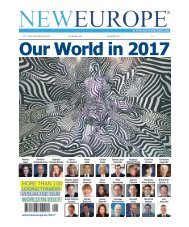Our World in 2018
Leading minds reflect on the state of our societies, and examine the challenges that lie ahead. An edition dedicated to generating ideas that will help form a new vision for our world.
Leading minds reflect on the state of our societies, and examine the challenges that lie ahead. An edition dedicated to generating ideas that will help form a new vision for our world.
You also want an ePaper? Increase the reach of your titles
YUMPU automatically turns print PDFs into web optimized ePapers that Google loves.
funded media outlets have been
accused of fabricating stories to
rally public opinion against NATO
membership. Russia has had time
overlooked disinformation campaigns
that accompanied Russia’s military
incursions into Georgia and Ukraine,
and the now-familiar mix of trolls,
bots and state-sponsored journalism
responsibility onto the United States
for the 2014 downing of Malaysia
Airlines Flight 17. In the United States,
is exacerbated by divisions within the
political establishment. During the
Cold War, the larger struggle against
communism created a mainstream
consensus about what America
stood for and against. Today, our
society appears to be defined by a
Democrats and Republicans alike. This
divisive environment can make the
media more susceptible to repeating
and amplifying falsehoods.
These days, the walls of our media
echo chambers are so soundproof
that, even after President Vladimir
Putin’s well-documented interference
TIMOTHY A. CLARY/AGENCE FRANCE-PRESSE — GETTY IMAGES
in the United States election, and his
his favorability among Republicans
rose substantially between 2015 and
President Trump’s inauguration, from
12 percent to 32 percent.
Most worrisome, many Americans
are questioning not only whether they
are obtaining objective facts — 60
percent believe news stories today
are “often inaccurate,” according
to Gallup, a major increase from 34
percent in 1985 — but also whether
objective facts exist at all. The sense
of an epistemological free-for-all
provides an opening to all comers.
Another reason for concern is
— political campaigns, companies,
foreign governments — can harvest
data (location, age, gender, likes,
shares) on its target audience,
personalizing messages to suit
the taste of those it aims to reach
and employing this customized
propaganda to skew the political
debate. Kremlin-linked ads have likely
reached millions of Americans, and
some were geographically targeted.
Because of the attention to last
year’s Russian election meddling,
OUR POLITICAL SOCIETIES
there is a risk that going forward we
mobilizing our defenses with a focus
on Russia or on the next election cycle.
But we must be on our guard toward
all adversaries at all times.
At the height of its military
successes, the Islamic State was
releasing 38 pieces of news and
propaganda on social media daily,
the majority of which was used to
attract potential recruits by falsely, but
persuasively, depicting utopian life in
ISIS-held territory.
The bipartisan Alliance for
Securing Democracy, meanwhile, has
begun tracking and exposing Russia’s
extensive disinformation efforts in
the here and now. For example, the
alliance documented how on the same
day in August when Mr. Trump signed
on Russia, the top story promoted by
Russian-associated Twitter accounts
concerned Hillary Clinton’s links to
foreign arms sales. More recently,
the alliance showed how Russialinked
accounts promoted alt-right
conspiracies about the violence in
Charlottesville, Va., as well as stories
that slammed those — like Senator
John McCain — who had criticized Mr.
Trump’s equivocal response.
This new dashboard is evocative
of a series of special reports by the
United States State Department that
in the 1980s sought to undermine
Soviet fake news by exposing
American public.
It is a testament to our times that
it now seems unthinkable that the
State Department — much less the
president — would publicly call out
the misinformation being spread.
But now that there is a genuine risk
of foreign powers who, in George
Washington’s words, “practice the
arts of seduction, to mislead public
opinion,” it is incumbent on the rest
of us to enhance our vigilance.
OUR WORLD | 2018
© 2018 Samantha Power. Distributed by The New York Times Syndicate
115










